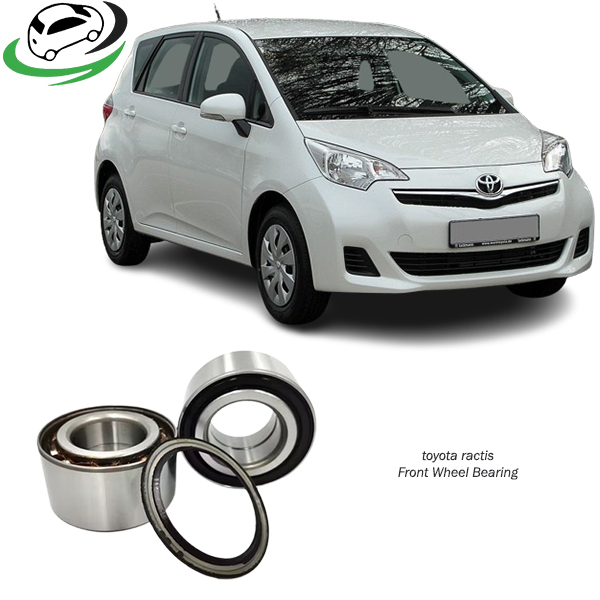-11%
Get Toyota Ractis Front Wheel Bearing Magnetic DAC40750039M in Kenya
The front wheel bearing magnetic type is an advanced component in modern vehicles, specifically designed to integrate with anti-lock braking systems (ABS) and traction control systems (TCS). Unlike traditional wheel bearings, magnetic wheel bearings are equipped with a magnetic encoder ring, which enables precise monitoring of wheel speed. This technological innovation enhances vehicle safety, improves driving stability, and supports critical electronic systems. Here’s a deep dive into its construction, functions, benefits, and maintenance.
1. Construction and Composition
The front wheel bearing magnetic type shares a basic structure with standard wheel bearings, comprising an inner ring, outer ring, and rolling elements like ball bearings or tapered rollers. However, it incorporates a magnetic encoder ring, a critical component that differentiates it from traditional bearings.
- Magnetic Encoder Ring: This ring is bonded to the bearing’s inner or outer ring, depending on the design. It consists of alternating north and south magnetic poles embedded in a rubber or metallic layer. Each pole is finely spaced and carefully arranged to create a magnetic pattern.
- Sensor Integration: The magnetic encoder ring works in conjunction with a sensor located on the vehicle’s wheel hub assembly or suspension system. This sensor reads the magnetic field’s changes as the wheel rotates, generating an electrical signal that corresponds to the wheel’s speed.
- Sealing and Durability: Since the encoder ring is sensitive to contaminants, magnetic wheel bearings feature enhanced sealing. These seals are designed to protect against dirt, water, and debris, ensuring the bearing’s longevity and consistent performance.
2. Functionality of Magnetic Wheel Bearings
Magnetic wheel bearings are primarily responsible for smooth wheel rotation while also feeding crucial data to the vehicle’s onboard systems.
- Wheel Rotation and Load-Bearing: As with all wheel bearings, the magnetic bearing supports the vehicle’s weight and reduces friction between the wheel hub and the axle, allowing smooth wheel rotation. This load-bearing capability is crucial for vehicle handling, stability, and comfort.
- Wheel Speed Data for ABS and TCS: The magnetic encoder ring provides real-time wheel speed data by interacting with the sensor. This data is sent to the vehicle’s ABS and TCS systems, which monitor and regulate wheel speed, especially during braking or acceleration.
- Enhanced Safety Features: When the ABS or TCS detects a difference in wheel speed that may indicate a skid or slip, it engages corrective actions. For example, ABS may pulse the brakes to prevent wheel lock-up, while TCS adjusts engine power to maintain traction. Magnetic wheel bearings, by supplying accurate speed data, enhance these safety features, improving vehicle control in challenging conditions.
3. Benefits of Front Wheel Bearing Magnetic Type
The integration of magnetic encoder technology into wheel bearings provides multiple advantages, especially in safety and vehicle control.
a. Enhanced Safety
The primary benefit of magnetic wheel bearings is the support they provide to ABS and TCS systems, enhancing vehicle safety. With accurate wheel speed data, these systems can detect and mitigate issues like wheel lock-up or spin during sudden braking or slippery conditions.
b. Improved Vehicle Stability and Handling
The precise data supplied by magnetic wheel bearings helps maintain traction and stability, particularly in adverse weather. Drivers experience improved handling and responsiveness, especially during sharp turns or emergency maneuvers.
c. Reduced Tire and Brake Wear
Because magnetic wheel bearings enable ABS and TCS systems to intervene efficiently, they help reduce unnecessary tire and brake wear. These systems regulate braking force and engine power, minimizing the chances of harsh braking and accelerating that can wear down components.
d. Efficiency and Fuel Economy
By maintaining smooth wheel rotation and supporting efficient braking, magnetic wheel bearings contribute indirectly to better fuel economy. Vehicles experience less drag, and the efficient wheel movement allows the engine to work with minimal resistance.
e. Integration with Advanced Driver Assistance Systems (ADAS)
Magnetic wheel bearings also support the data needs of ADAS, which includes features like electronic stability control and adaptive cruise control. The accurate wheel speed measurements help these systems operate effectively, increasing overall driving safety and convenience.
4. Maintenance and Tips for Longevity
Front wheel bearing magnetic types are generally designed for long service lives, but regular maintenance is key to ensuring optimal performance. Here are some maintenance tips and signs of wear to watch out for:
a. Regular Inspection
Routine inspection is essential to identify early signs of wear or damage. Visual inspections for any signs of leakage around the wheel hub, unusual noises, or abnormal wheel play are crucial in detecting issues early.
b. Listen for Unusual Noises
A failing wheel bearing often produces a humming, rumbling, or growling noise that increases with speed. This noise may worsen when turning, indicating excessive wear or possible damage. When dealing with magnetic wheel bearings, such noises also signify a possible sensor malfunction, as the noise may interfere with accurate data transmission.
c. Avoid Overloading
Excessive vehicle load can put undue stress on wheel bearings, leading to premature wear. Drivers should be mindful of weight limits and avoid carrying loads heavier than what the vehicle’s specifications recommend.
d. Protect Against Contamination
Contaminants such as dirt, water, and road salts can enter the bearing, potentially damaging the magnetic encoder ring. Regularly washing the underbody of the vehicle and using protective seals can help keep contaminants away from the bearing assembly.
e. Ensure Proper Installation
Improper installation can lead to premature bearing failure. Magnetic wheel bearings require precision, particularly with the positioning of the encoder ring and sensor. Any misalignment can disrupt the encoder’s signal and affect ABS and TCS performance. Always have an experienced technician perform bearing replacements.
f. Avoid Driving Through Deep Water
Magnetic wheel bearings are sensitive to moisture, and driving through deep water or floods can lead to contamination, affecting the bearing’s functionality and reducing its lifespan. If driving through water is unavoidable, inspect the bearings soon after to ensure no damage has occurred.
5. Signs of Wear and Failure
Several symptoms may indicate a problem with the magnetic front wheel bearing:
- ABS Warning Light: A malfunctioning magnetic encoder can trigger the ABS warning light. If this light illuminates, it often indicates a disruption in the sensor’s ability to read the magnetic field, potentially due to encoder ring damage or misalignment.
- Unusual Sounds: As mentioned, growling or grinding noises are telltale signs of a failing wheel bearing. These sounds may worsen during turns or under load and should be inspected promptly to prevent further damage.
- Vibration in the Steering Wheel: A damaged or worn-out wheel bearing can cause vibration in the steering wheel, especially at higher speeds. This vibration can escalate as the bearing deteriorates, affecting vehicle control.
- Poor Handling: A compromised bearing can lead to play in the wheel, reducing the stability and precision of the steering. Drivers may notice a wandering or unstable feeling while driving, especially during turns.
6. Replacement Considerations
When a magnetic wheel bearing reaches the end of its service life, replacement is necessary to maintain vehicle safety and performance. Here are some tips for a successful replacement:
- Choose Quality Parts: Opt for high-quality, OEM or trusted aftermarket magnetic wheel bearings. These bearings meet the vehicle’s design specifications and are compatible with ABS and TCS systems.
- Professional Installation: Magnetic wheel bearings require precise alignment with the sensor for proper function. DIY installation can be challenging due to the encoder ring and sensor requirements, so professional installation is often recommended.
- Replacement in Pairs: It’s generally advisable to replace both front wheel bearings simultaneously, even if only one shows signs of wear. This approach ensures balanced handling and even wear distribution, extending the lifespan of both components.
Conclusion
The front wheel bearing magnetic type represents a significant advancement in automotive technology, directly contributing to improved safety and driving dynamics. By supplying precise wheel speed data, magnetic wheel bearings enhance ABS, TCS, and ADAS functions, ensuring smoother rides, better control, and heightened safety. Proper maintenance and timely replacement of worn bearings are essential to sustain these benefits, making magnetic wheel bearings a critical component in modern vehicle safety and performance systems.
Follow us on Facebook for more parts.



